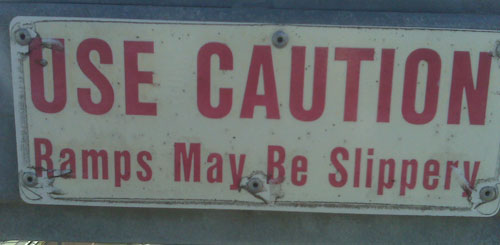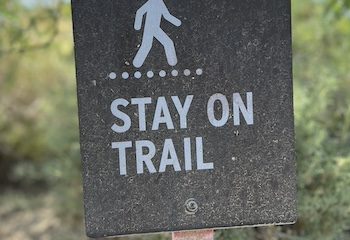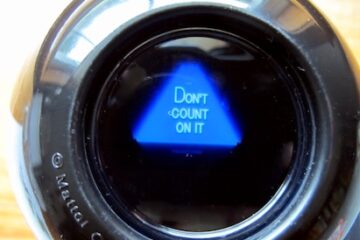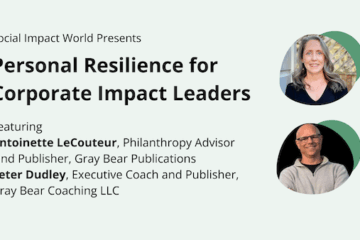Intentionally seeking outrage can lead to personal imbalance
I learned some things when the #MeToo movement happened.
For example, I learned that when someone says something that makes me feel like responding with “hashtag not all [something about me],” then it’s time to pause, breathe, and listen.
#NotAllMen. #NotAllWhitePeople. #NotAllCisPeople. #NotAllPeopleWhoShareATraitWithMe.
I am grateful to my friends who helped me understand that #MeToo and #YesAllWomen were not about how bad men were; they were about bringing to light a shared experience that all women have had.
A few years after that, I was arguing with one of these same friends about how religion—particularly Christianity—influences nearly all narratives in the United States. As a secularist, I am keenly aware of many ways that religious beliefs encroach on the lives and freedoms of non-religious people.
My friend kept countering my statements with specific examples from her own personal experience. Christians who are good people, who do good things.
Eventually I realized what was happening and said, “So, then… hashtag not all Christians?”
She paused. “Yes, I suppose so. Fair point.” And then we switched topics.

This post is not about privilege or inequity
Although I’ve faced my own obstacles in life, I am well aware that I am very fortunate to enjoy several dimensions of privilege. Systemic bias is real. Systemic inequity is real.
(If you don’t think that’s true, I suggest that you might benefit from some coaching on self-awareness.)
This article is not about these things. They simply provide the backdrop.
Today I was struck by an anti-men post I saw online. I had that visceral #NotAllMen reaction that sometimes still comes to the surface.
So I paused. I took a breath. I tried to listen.
I read the post again, and what I saw there was not healthy.
This post was from a highly respected feminist influencer who often writes strongly worded bits about systemic injustice. She often points out facts—pay disparity, inequity in positions of power, instances of toxic masculinity—and is actively working to bring those wrongs to light and encourage systemic, societal change.
This particular post, however, began with an “us versus them” mindset and continued to dig deeper into divisive and inflammatory language. After sitting with it for a while and rereading again, I decided my initial knee-jerk feeling of #NotAllMen was warranted.
This post is about imbalance and self-awareness
Everyone will get it wrong from time to time. Even the smartest, most thoughtful, most articulate person will say stupid things. I certainly do sometimes. (You may think this article is one of those times. 🤷🏼♂️)
If you say enough things, you are bound to stumble.
What was different about this post was the underlying imbalance permeating it, fueling a bonfire of generalizations, accusations, and vitriolic outrage.
I’d seen this kind of imbalance before, when someone intentionally seeks out and spends too much time among bigoted people who overtly and aggressively hate them. Intentionally engaging the trolls.
When my trans teen was in her most depressed phase, she spent a lot of time in online forums with transphobic and bigoted people who often told her she should kill herself. Obviously, this was neither healthy for her, nor a path toward health.
Yet it became almost like an addiction. The emotions riled up by their hatred were so powerful that she kept returning, even though those emotions were destroying her.
What I saw in this influencer’s post was something similar: Her furious rage made me think that she probably kept going back to engage again and again with the toxic trolls. That rage had taken over, pushing her past the point of rationality.
In her quest to defeat the trolls, she kept going back for more. And they, being horrible extremists who enjoyed riling her up, got ever more aggressive and despicable. It had to boil over at some point.
Unfortunately, it boiled over in a flaming, rage-filled post that I don’t think did much good for her brand or her reputation. To me, it felt self-destructive.

What influences do you seek out? What influences do you let in?
The lesson in this, as I see it, is that we all need to constantly examine how our attitudes, behaviors, and choices are being influenced by others.
If we’re not careful and attentive, then we might let those influences rob us of our reason and our perspective. They can even push us to betray our own values and act in self-destructive ways.
As I write this, I think about a time many years ago when a close friend told me they thought I was being self-destructive. Time and distance have given me more perspective on that situation, and a better understanding of the ways that others were influencing me at the time… including that close friend.
This is why it’s important to understand your values, and to be aware of where your center is. Only then can you see when you’re being pulled away from your center, and work to nudge yourself back to that place.
At the time, I thought the behaviors that my close friend described as self-destructive were actually self-preservation. I still believe that to be true, though if I’d had a more developed self-awareness, I may have been able to arrive at slightly better outcomes.
If you’re unaware of your center, or if you lack the tools to constantly re-balance yourself, then you’re at risk of giving control over to those influencers… for better or for worse. And you might not know which until it’s too late.
I can help
Becoming more self-aware is one of the key things a credentialed coach will help you do. If you’re interested in learning more, set up some time with me and we’ll talk.



0 Comments